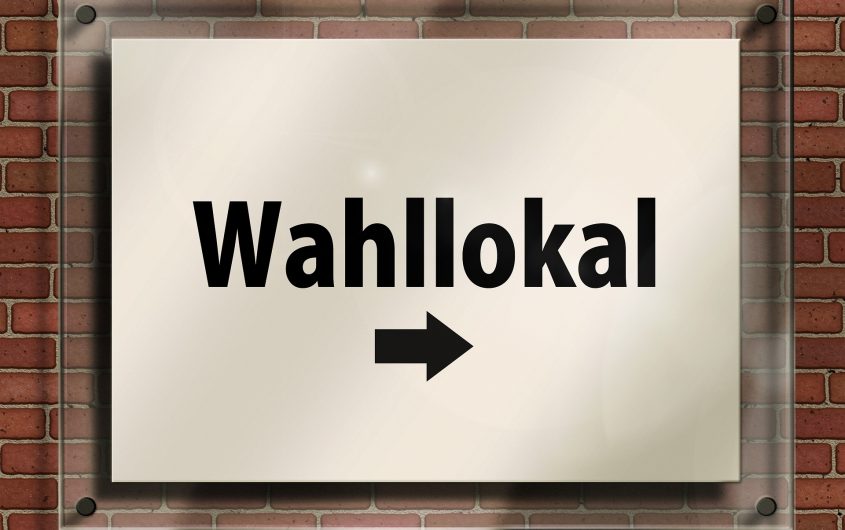
via Pixabay
The 2021 Superwahljahr Begins

Benjamin Duffy-Howard
Ben Duffy-Howard is a development intern at AICGS for the spring of 2021. He prepares briefing material, manages databases, supports the research projects of resident fellows, and helps to organize and document AICGS events.
Currently, Mr. Duffy-Howard is pursuing a BA at American University in German Language and Area Studies and a minor in International Studies. His coursework and research interests focus primarily on the Transatlantic relationship, German language, and German culture. He also enjoys studying philosophy, history, and other foreign languages.
Before coming to AICGS, Mr. Duffy-Howard participated in hosting AMERIMUNC, American University’s high-school model UN conference.
The elections in Rhineland-Palatinate and Baden-Württemberg
In German politics, the term Superwahljahr (super election year) refers to a year in which there will be many elections at various levels of government. The first designated Superwahljahr was 1990 after the reunification of Germany, which involved many regional elections in the five new states of the former East Germany and the first all-German election since 1933. Eventually, the East German states stopped having elections all in one year, but 1994, 2009, 2011 all were Superwahljahr years. On March 14, the 2021 Superwahljahr will begin with the state elections in the western states of Baden-Württemberg and Rhineland-Palatinate.
As with other state elections, these upcoming elections will be seen as a referendum on the current state of the largest German political parties as the September Bundestag election looms and the coming post-Merkel era beckons. Based on how these elections go, there will be lessons learned by the parties that can be applied to the federal elections. This will also be the first electoral test of Armin Laschet at the head of the CDU.
Party Dynamics
For much of its history, Rhineland-Palatinate was a CDU stronghold, but this changed in the twelfth Landtag in which the SPD became the new ruling party. This happened during the 1991 elections in which SPD leader Rudolf Scharping won the most seats, though not a majority due to a waning in Kohl’s popularity due to tax issues among other things. This was no small feat for Scharping, as Rhineland-Palatinate was Kohl’s home state. The Greens have never been too successful in this Bundesland, and the CDU has always polled behind the SPD ever since the shift in the 1990s. The third most popular party in the state is currently the AfD, but since the CDU lost consistent control of the Bundesland, the FDP has taken third place consistently.
In contrast to Rhineland-Palatinate, Baden-Württemberg, while also having a decades-long history of CDU dominance, has only recently had a change in the ruling party. In the 2011 election, the Greens wrested control from the CDU with the help of the SPD, though the CDU remained the largest single party in the state. This changed in the 2016 elections due to voters from the SPD switching over to the Greens, and the AfD taking votes from the largest right-wing competitor to the Greens, the CDU. According to recent polling putting the Greens at 32 percent and the CDU at 25 percent, it seems they will maintain the Green-Black coalition formed in 2016.
Issues
The incumbent government of Rhineland-Palatinate is led by Malu Dreyer of the SPD, and in Baden-Württemberg, the incumbent government is led by Winfried Kretschmann of the Greens. Kretschmann seems to have a less contested election, but in Rhineland-Palatinate, the polls are showing a closer race. In 2021, Baden-Württemberg created a new innovation strategy to plan for future economic growth. The main focuses of the incumbent government are “digitalisation, artificial intelligence and Industry 4.0; sustainable mobility; health economy; resource efficiency and energy transition; sustainable bio economy” all in line with the environmentalist platform of the Greens. In Rhineland-Palatinate, the focus of the incumbent government has been to increase competitiveness and technological advancement. Both regions of Germany are known for their economic might and technological innovation, and it seems both aim to keep it that way.
The main issues of the election in Rhineland-Palatinate are related to reopening the economy in the wake of the COVID-19 pandemic. Dreyer believes that the focus should be on supporting the family and small businesses that have been hit hardest by the effects of the lockdowns. She also says that all children will be able to go back to school before the Easter holidays. So far relief for citizens has fallen through the cracks, but Dreyer assured that there will be relief coming. In Baden-Württemberg, the focus is more on energy, the environment, and the effects of the COVID-19 pandemic. Kretschmann has mentioned specifically removing taxes on energy to lower the price for consumers. He would also like to continue with Merkel’s efforts to phase out nuclear energy. According to Imanuel Marcus of the Berlin Spectator, “voters in Baden-Württemberg are interested in Corona policies, education, the economy and ecology,” and these are the issues that Kretschmann has focused on throughout his political career. He is known for being cautious about reopening, and that is one of the major differences between him and his CDU opponent Susanne Eisenmann.
National Implications
On a national level, not all that much would change with a Kretschmann victory other than a continuing solidification of the Greens control of the state, and perhaps a move away from a Green-CDU coalition towards a Green-SPD-FDP alliance. Though unlikely, a “traffic light” coalition could be possible if Kretschmann finds that there is too much difference between CDU and Green policy on COVID-19 based on Eisenmann’s criticisms of continued lockdown and limitations on in-person schooling. Due to Kretschmann being more cautious if he wins another term it will certainly slow the pace of the reopening of German states. With Dreyer from the SPD and Christian Baldauf from the CDU competing in Rhineland-Palatinate, there is a chance for the CDU to come back and end a period of SPD dominance in the state government. However, this may be very unlikely because Malu Dreyer is a popular candidate and leaves little to be criticized especially with respect to her policies about COVID-19. A worse-than-expected result for the CDU in either state could also affect CDU chair Armin Laschet’s chance of a CDU/CSU chancellor candidacy. All in all, it will be quite interesting to see how these elections turn out and what their consequences will be for the respective states and the German nation.








